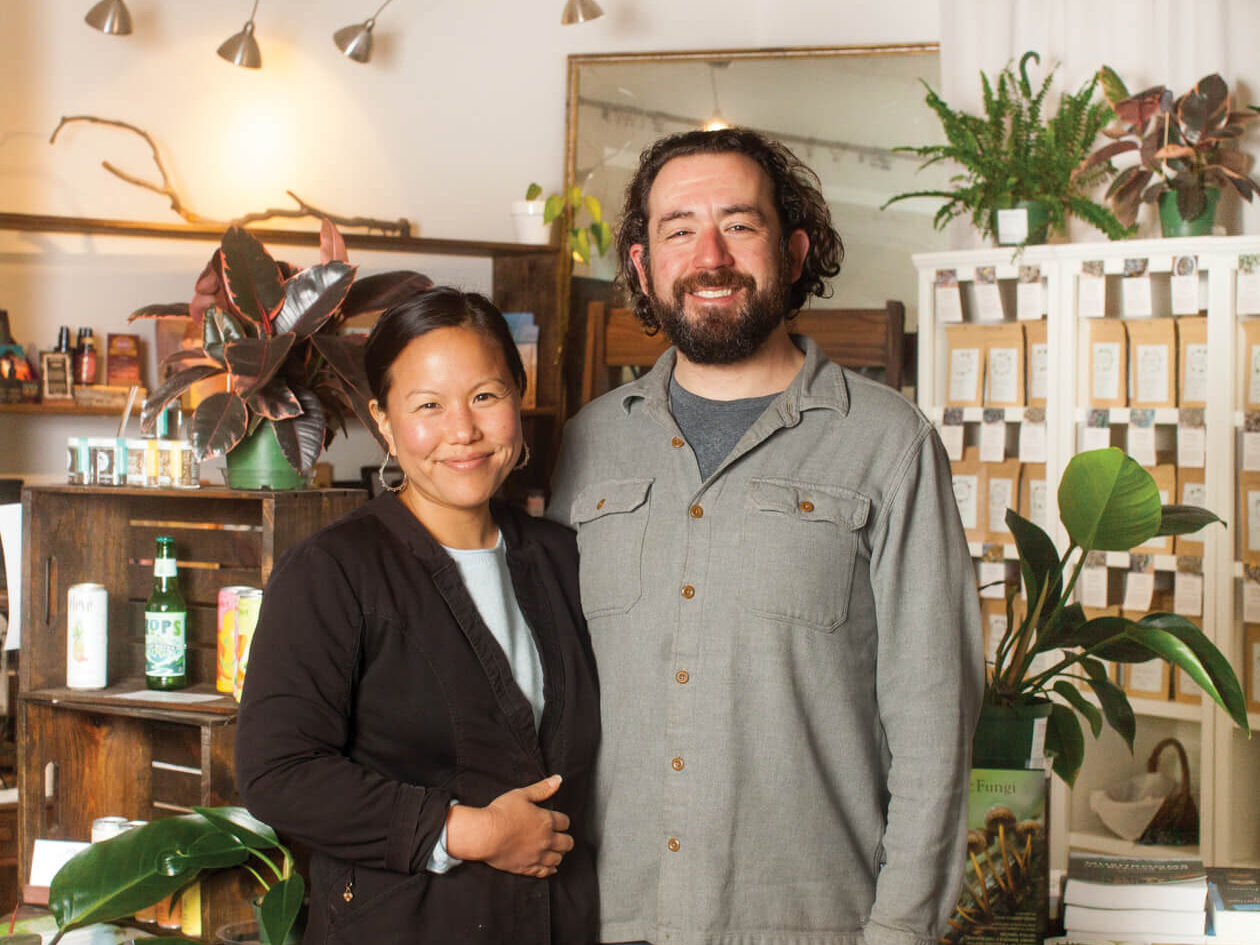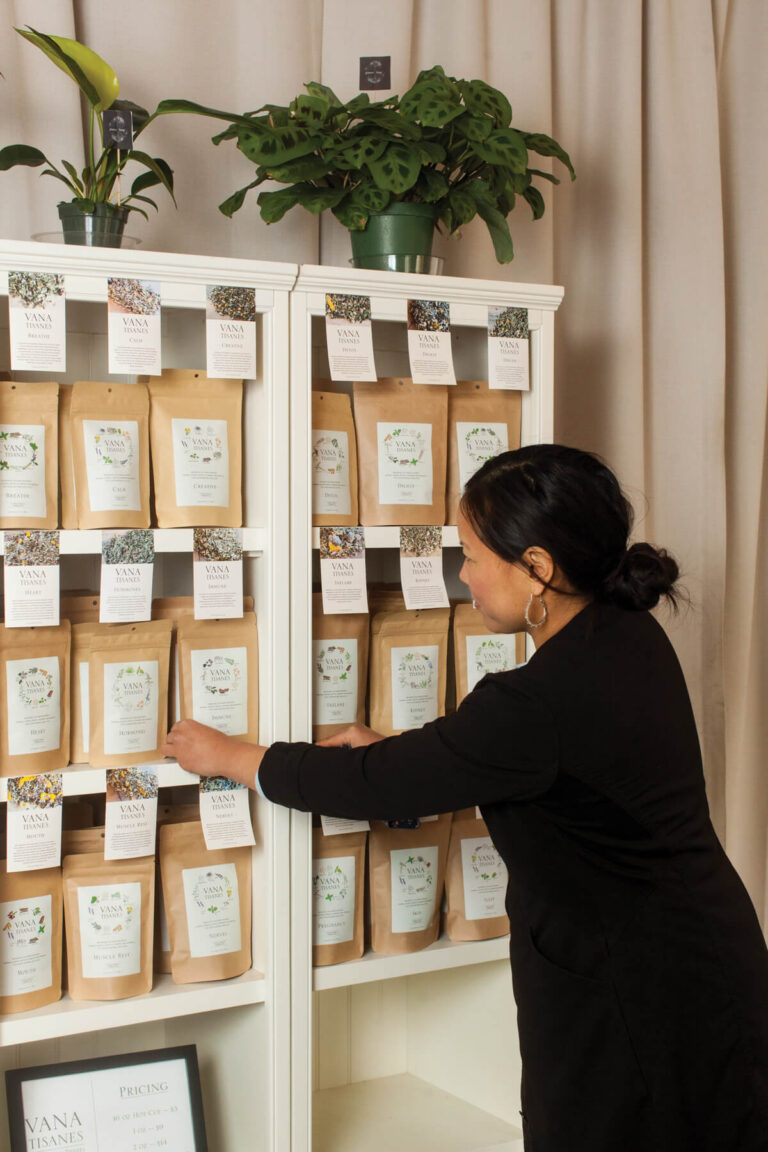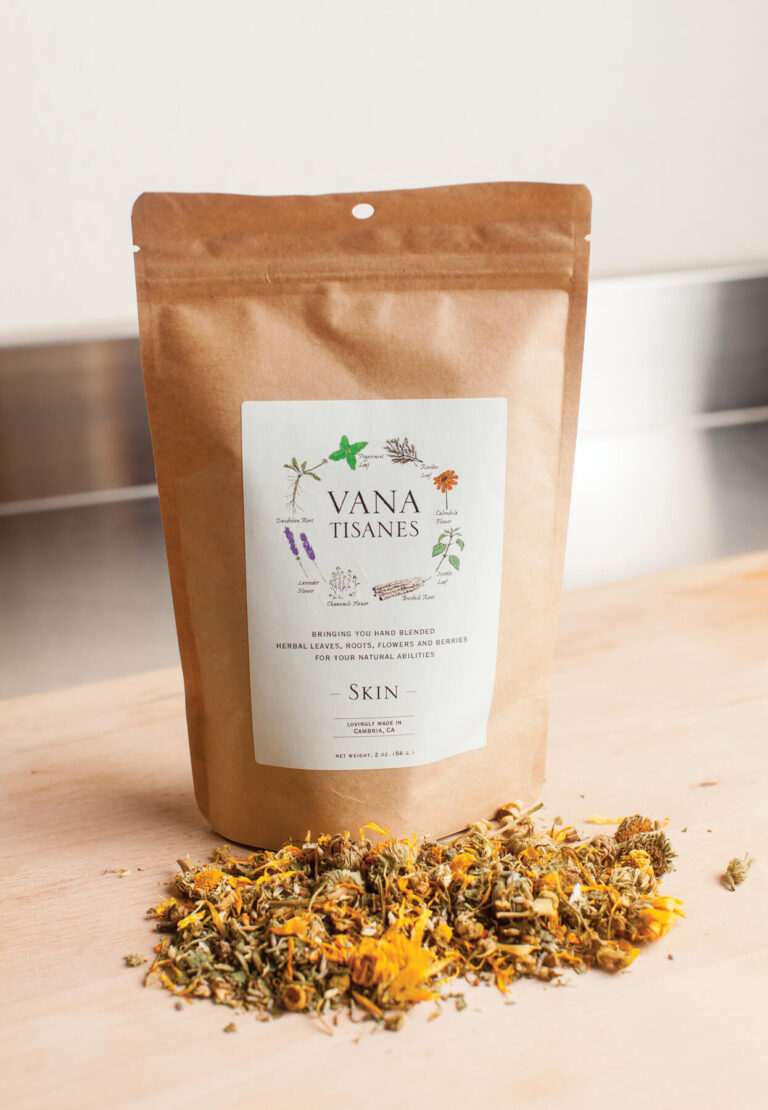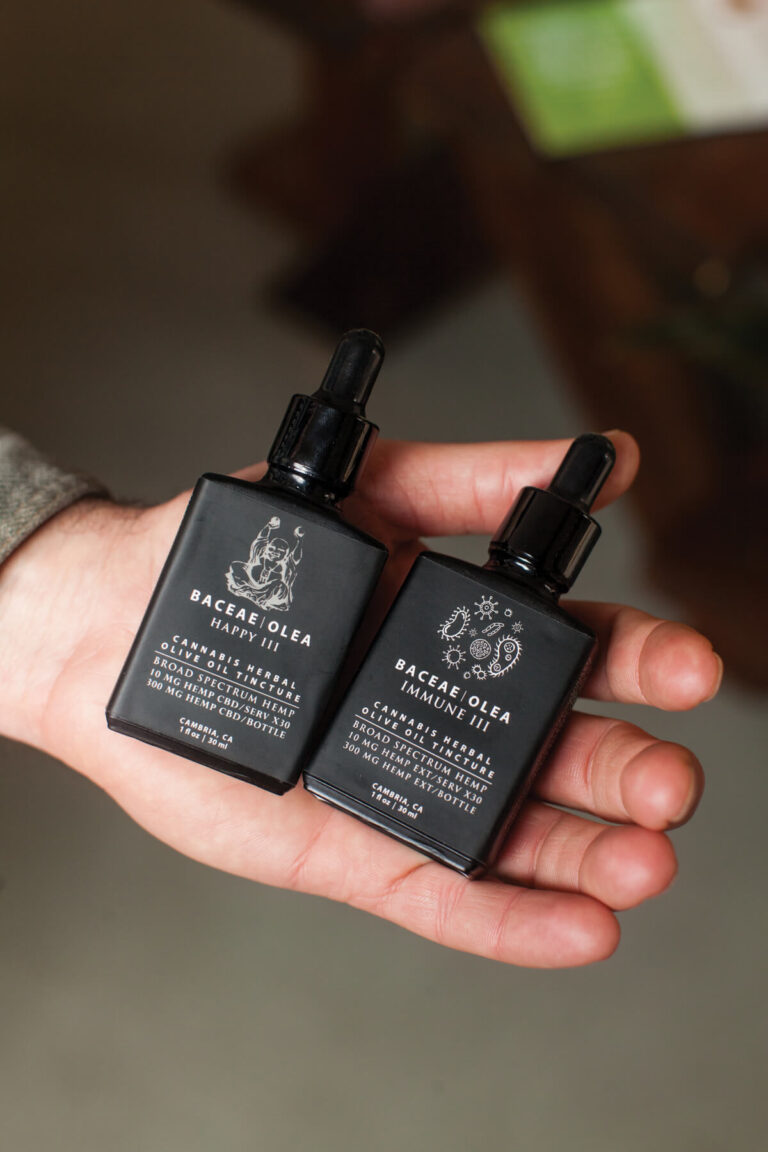
Nourished by Nature
Story By Erica Thatcher
Photography by Jennifer Olson
Glass jars brimming with mysterious herbs, brown dropper bottles of tinctures and tins of fragrant salves — are these substances folkloric magic or are they medicine? Walking through the different local herb shops, it feels like a little of both. Science shows traditional healing plants can treat a variety of ailments and promote overall well-being, as these Central Coast herbalists explain.
“Everything is interconnected,” say Mike Coulson, Co-owner of Plantae & Fungi with Miho Watanabe. “If we don’t get enough sleep, we’re going to get stressed.” Plantae’s herbal tisanes (teas), mushrooms and healing food menu address sleep problems, digestion, hormone imbalances and more. Mike and Miho are also the founders of herbal tea brand Vana Tisanes, and they sell air-purifying plants in their shop, too. “There’s a functional aspect to everything we offer,” says Miho.

A lot of people aren’t sure where to start their healing journey. Mike has an answer for moving past that overwhelming feeling, in an easy, drinkable way. “Teas! They think ‘I can do that,’” he says. Miho also acknowledges the simplicity of ingredients in their loose-leaf tisanes. “You know exactly what’s in it,” she shares.
The taste of a tea is important because it’s easier to add these gentle teas to your daily routine if they taste good. There’s no shame in mixing, matching or modifying, and Mike assures that “it’s okay to add sweetener!” In fact, the licorice added to Liver, one of Plantae’s tisanes for digestion, lends a sweetness that tames bitter chicory and dandelion roots. Soothing peppermint finishes the unique blend.
Each “powerhouse” tisane contains at least seven herbs. Plantae Plant Manager Daniel Becker, who makes the tisanes and tinctures, says the numbers of herbs and types of blends are intentional. “With herbs, I feel like their powers go where they’re needed,” he explains.

And to reach full power, Spellbound Herbs Gift Shop & Garden Owner Kathryn Clayton says herbals belong in a daily routine. “To make herbals work, you’ve got to keep taking them. They don’t work instantly.” She points out that a lot of today’s common medications are synthesized, hyper-concentrated versions of flowering plants that were used in traditional healing.
From her Cambria location, Kathryn created Spellbound’s herbal teas using traditional healing recipes: Stress Less layers fragrant chamomile, lemon balm and hops to calm nerves; Cold and Cough mixes yarrow and elderflower with peppermint to open bronchial passages.
A dose of plant oils can be healing, too. Kathryn’s popular salve for headaches uses aromatic peppermint, arnica and eucalyptus essential oils. The Spellbound gardens offer a variety of botanicals that feature fragrant rosemary, an 80-year-old climbing rose and the magical blooms of edible nasturtiums.
Engaging the senses is important to Los Osos herb grower and distiller Staci Thompson, who finds magic working with her botanicals pre-harvest. “It gives me an opportunity to indulge my senses with vibrant colors and refreshing scents,” she shares. Her favorite spring herb is wild — a native chickweed that arrives in her garden on its own every year. “Internally, chickweed is a nourishing tonic, like most spring herbs,” she says. “I make an extract or tea for skin that is irritated, dry, itchy or has a rash.”
Other medicinal botanicals that thrive in Staci’s spring garden include beginner-friendly heartsease, plantain, rose, calendula and sweet violet. All have cleansing properties, and their flavors wouldn’t be out of place in a simple mesclun salad.

Owner of Spice of Life, a spices and herbs shop in Paso Robles, Lori Foster sees her shop as a space for healing. “I consider this store one big medicine cabinet,” she says. And unlike the bitter medicine Julie Andrews as Mary Poppins sang about, many people don’t realize how easy it is to consume medicinal herbs.
“We think of parsley as just a sprig on the side of the plate,” says Lori. “But it’s great for detoxifying and cleansing.” For example, she says the thyme bubbling in soups and sauces is releasing antibacterial oils as it simmers. “Herbs we take for granted, they taste good and heal.”
Lori delights in removing the mystery of herbs; she suggests adding edible flowers or heaps of healing green herbs like dill, cilantro, parsley and basil to meals. Herbs are for everyone, she explains. “I love it when kids come in. I pay special attention to kids who are interested in cooking and teas.”
Lori blends herbal teas, too. Her most-requested teas address sleep, anxiety and digestion. She created her 2020 Herbal Tea during the pandemic. “It helps with all the things we were dealing with — heart support, lung support, emotional support, grief and loss. It’s a hug in a cup.” Her blends include balancing holy basil, nerve-calming lemon balm and hawthorn and rose, which aim to soothe heartache.
A lifetime journey with herbs has given Lori and her fellow herbalists a respect for the diversity of plants, and she can relate to anyone who’s new to herbal healing. “When I first started, I was overwhelmed,” she reflects. “But I took the time and patience with each herb and worked to bring them together.”
Top Tips from Herbalists
Identify your concern. Maybe it’s trouble with sleep or relaxation. Looking to kick-start your digestion? “Identify your health and healing goals,” says Mike. And stick with it, he says. “It’s not just a one-time treatment.”
Find your format. It’s easy to start a daily practice with gentle herbal teas and culinary herbs as preventative medicine, say our experts. Or try other forms, like tinctures, salves, steams or poultices.
Try DIY. Check your pantry for familiar flavors like mint, ginger, sage and turmeric, says Miho. Mediterranean herbs like rosemary, sage, mint and thyme are easy to grow. “Growing herbs is fulfilling and gives you confidence,” says Kathryn.
Don’t be afraid to ask. Herbalists want to help; collaborating to create custom blends is a perk of the job. “The bonus of all of this is introducing things to novices as well as professionals,” says Lori. Ask your physician, if you’re taking medication.
Mingle with nature. Wandering through gardens, scrubby chaparral or grounded oak leaves and pine needles offers a dose of feel-good oils called phytoncides. Those inclined to nibble the wild stuff should always consult an expert about safety and sustainability.

